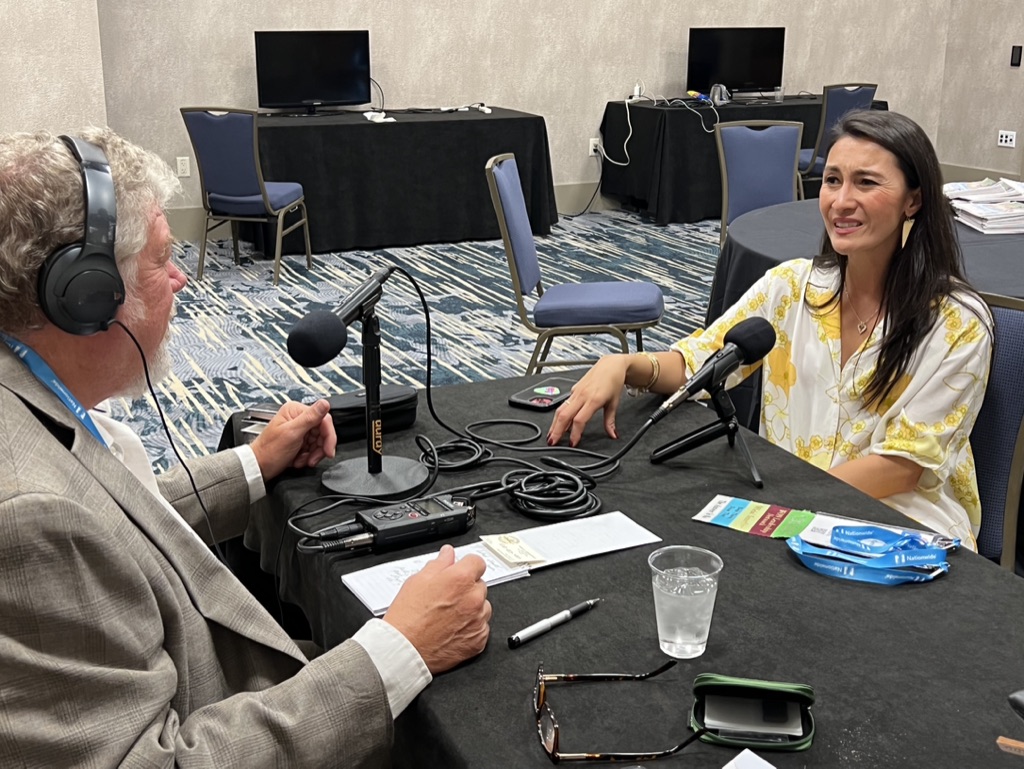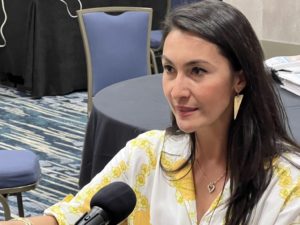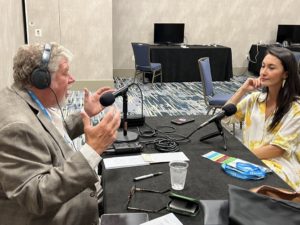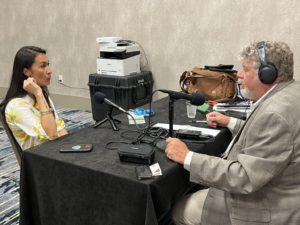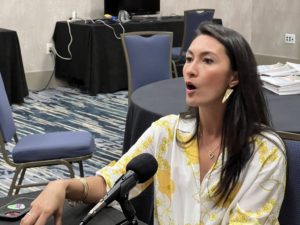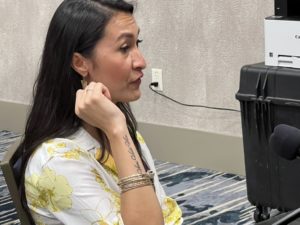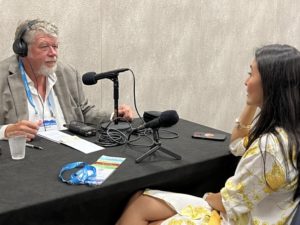Host, David Martin sat down with Hawai’i County Council Member Ashley Kierkiewicz at the annual National Association of Counties conference as part of a series of conversations with those in and around county government. Our own Good Government Show questionnaire.
Helpful Links:
Thanks to our sponsors:
A Conversation with Hawai’i County Council Member Ashley Kierkiewicz Transcription
David Martin: This is the good government show.
Ashley Kierkiewicz: My definition of good government is when our policymakers are legislators are working in partnership with communities. Community members have a seat at the table and elected officials are actually listening and working with community members to solve issues. Let’s be honest. Let’s not hide anything. Let’s give everybody the raw truth. That way, we at least know and can make the best available decisions based on what we’re hearing.
I think it goes a long way when your constituents proactively reach out and say, thanks for helping me solve that issue. Thanks for always having our back. We support you. So those are those are pulse checks for me that I’m on the right track. How else am I going to be grounding my decision making if I’m not with the people in the community, have to be in touch with them in order to, I think, be effective and advocate for their issues.
David Martin: Welcome to the good government show. Any good government show extra? I’m your host, Dave Martin. I recently attended the National Association of Counties Annual Conference. This is where many of the nation’s county officials gather to share ideas, set a course for the coming year and promote good government. I talked to many county leaders and asked them to define what good government needs to them and how they measure their success.
Here on this special edition of the Good Government Show, Are there answers? It’s our own good government show questionnaire. And in this episode, we’re going to go to Hawaii. Not really, I wish, but when I met Ashley Kierkiewicz, I felt like I was almost there. County Council member Kierkiewicz is Hawaii born and raised and you think what problems could there possibly be in Hawaii?But she has serious challenges in her district and we’ll learn more about them when we come back with that conversation with council member Ashley Kirkwood’s right after this.
The Good Government Show is sponsored by NACO. That’s the National Association of Counties County Government is actually the oldest form of government in the in the United States and touches more people directly. Think about it. Roads, highways, hospitals, schools, recycling, law enforcement, water and sewers. In most of the country, those services are maintained by the county. That’s county government. NACO is a nationwide organization and they represent all 3069 counties across the USA. NACO helps county government work better together, do things like sharing best practices and as we see in this and other episodes, when county government works well, well, that’s just good government. The Good Government show gets many of our stories from NACO. So thanks for the stories and thanks NACO for working to support good government.
Welcome back to the Good Government Show. If you like what you hear, then please like us and follow us on Facebook and Twitter and rate us on the podcast platform where you’re listening. Now your comments help us continue to tell these great stories. And of course, listen to season two of the good government show. Now here’s my conversation with Ashley from Hawaii.
This is David Martin. This is a special edition of The Good Government Show. I’m here with Ashley Kerkovich from Hawaii, a county commissioner from Hawaii. We are here at the National Association of Counties Annual Convention. And I wanted to talk with you a little bit about government. But first, if you could introduce yourself, tell me who you are, your middle name as well, where you’re from, and what brought you here.
Ashley Kierkiewicz: Aloha, David. It is so good to be with you. My full name is Ashley Lee Lani Kierkiewicz. I hail from Hawai’i Island. I was born and raised there and just so lucky to be representing that particular community. I’m a mother of two. I have a ten year old daughter and a five year old son. I graduated from the University of Hawaii at Hilo with a bachelor’s degree in political science.
I interned for Senator Daniel Akaka in Washington, D.C. I’ve always considered myself a political animal, and so I’m really happy to be in this capacity of, I think, building trust in communities so that people think government is actually good and doing something good for them.
David Martin: But do you surf?
Ashley Kierkiewicz: I do surf. That is actually how I met my partner. I left my phone number on his truck. Call me his true story.
David Martin: It was he a very good surfer as well.
Ashley Kierkiewicz: You know what? I was you know. Yeah, there was some of that going on. But yes, we do surf. That is an absolute pastime of ours.
David Martin: How often you get out?
Ashley Kierkiewicz: Not often enough, but we do have folks in the county government that surf as well. So we have these things called board meetings. For real in the water.
David Martin: This is, you know, leaders in Hawaii. Tell me about a.
Ashley Kierkiewicz: Board meeting, board meeting where we all paddle out together and sometimes we’re talking story about work, but mostly it’s just, you know, let off some steam. There’s a lot of pressure that we are facing as county government as you know.
David Martin: So it’s sort of just pressure of the competition.
Ashley Kierkiewicz: Absolutely. I like those boys in the dust. Do you? I do.
David Martin: All right. Well, you’ve been doing your whole life, so I want to just talk to you a little bit about government and about what government means to you and what people should know about government. So what is good government to you?
Ashley Kierkiewicz: My definition of good government is when our policymakers, our legislators are working in partnership with communities. Community members have a seat at the table and elected officials are actually listening and working with community members to solve issues. Everybody, I think, has an a contribution to make in building and sustaining our communities.
David Martin: How do the people that you serve, how do they know and not just you serve, but anywhere in the country, how do they know? Is there actually getting good, effective government?
Ashley Kierkiewicz: I’ll give you an example. So our office works with the Callaway Recovery Team, and I think I mentioned this to you, but I represent the district that was inundated by lava in 2018 and we thought we have to do things differently. There’s no trust. There’s a history of broken trust in our community. And so we went after the USDA Rural Placemaking Innovation Challenge, our pit grant.
We’re one of 13 communities across the country that were selected. And our demonstration is, can community and government work together? We developed this beautiful recovery and resilience plan, $1.8 million plan. And this particular grant is helping us to work in partnership with community members to take action on that plan. And it’s working. We have been implementing this stretch for over a year.
More and more people are coming to our events, signing up for these resilience committees and they’re committed to taking action.
David Martin: And what do the people in the community like when they come to these meetings? What’s what’s their reaction?
Ashley Kierkiewicz: They are, I think, really impressed that so many members of county government are showing up on a regular basis and being very transparent about information. That’s something that I really expect of our directors is even if we have bad news to deliver, deliver it. Let’s be honest, let’s not hide anything. Let’s give everybody the right trust. That way we at least know and can make the best available decisions based on what we’re hearing.
David Martin: So just tell me.
Ashley Kierkiewicz: Don’t sugarcoat it. Don’t sugarcoat it. Don’t lie to me. Right. That’s the other thing, too. We do not I don’t like I don’t like to tolerate lies.
David Martin: There is certainly a perception in America right now that all politicians lie. You know, this guy lies more than the other. How do you combat that?
Ashley Kierkiewicz: How do I. I just show up. I’m who I am. I’m one of the people. You know, I, I make sure that I am always in, you know, constant connection, communication with my community. And so there’s there’s trust there. There’s absolutely trust there. I will take the administration on if I have to, because that’s what the people need.
They need a champion. They need someone to be elevating their issues and being their voice. And so I make sure to deliver the truth.
David Martin: How do you know? What’s your personal yardstick for knowing if you’ve been effective, if you’ve been providing good leadership, good role models, and ultimately good government being reelected?
Ashley Kierkiewicz: So here I mean, for the county, right, we are limited to eight years and so we’re up for reelection again this year.
David Martin: How long have you served?
Ashley Kierkiewicz: I’m actually this is my fourth year of office, and so I’m up for my third term. And I have folks that are coming up to me all the time saying, we need you, we need you there. I will do everything I can to support you to make sure that you are continuing to be our public servant.
David Martin: Other than being reelected. Yeah. Is there anything that you look for day to day, week to week, you know, over time, over the year so that, you know, you’ve done a good job and then you you can explain to the people how you’ve done a good job.
Ashley Kierkiewicz: I will be in the local grocery store and someone will be like, Hey, you’re actually our council member, right? Thanks for doing a good job. And sometimes that sort of acknowledgment and recognition comes on their very worst days. I’m having it work. And so I’m like, okay, there’s a reason why I am here and I’m doing this work.
People see you and they appreciate you. We don’t always, I think as public servants get recognition or just a thanks, a simple thank you. And I don’t think we’re you know, we’re serving to, you know, get awards or anything. But I think it goes a long way when your constituents proactively reach out and say, thanks for helping me solve that issue.
Thanks for always having our back. We support you. So those are those are pulse checks for me that I’m on the right track and doing things. And I think another testament is when people show up, when we have activations and events and projects and policy, people are showing up to testify, they’re showing up to participate. I think it’s because they believe in in the leadership that’s being provided.
David Martin: By being a county commissioner, you’re you’re sort of closer to the ground. I mean, you said you had two kids. You said you were in the grocery store. So you’re out in the community. You see, that helps. Do you think that makes a difference?
Ashley Kierkiewicz: Yes. How else am I going to be grounding my decision making if I’m not with the people in the community just to be in touch with them in order to, I think, be effective and advocate for their issues?
David Martin: It’s going to be hard sometimes when you’re sort of frazzled and you’re picking your kids up from sports or class and something, and you’ve got to run to the grocery.
Ashley Kierkiewicz: Store always on dinner. You’re always on.
David Martin: You’re always on.
Ashley Kierkiewicz: Yeah, you’re always on. But I’m here for it. I love that.
David Martin: So you can’t run out in sweatpants and a t shirt?
Ashley Kierkiewicz: Yes, I do. And I really think that I’m going incognito and people still recognize me. But it is what it is.
David Martin: So you work for the people. What should the people look for? To know that you’re being effective or to know that their elected leaders are looking are working for them? What should they look for?
Ashley Kierkiewicz: I mean, someone that’s always engaging you, listening to you, and helping to problem solve with you.
David Martin: And do you find that they’re honest and aggressive when you when you see them out in the supermarket and it’s a beach?
Ashley Kierkiewicz: Really depends on the issue. Yeah. Yeah, I really think it depends on the issue. But I haven’t had anybody like to my head off over anything. No. Yeah, I think people are. I think I also need to not take it personally. Great sometimes, especially with love of recovery. Right. We are trying to restore critical infrastructure. And in the last administration, some work wasn’t happening.
And so I know when they’re getting frustrated and upset about their roads and not being restored, it’s not aimed at me. It’s at the larger system. And once they get it out of their system, we’re okay. We’re all on the same page. Rollins Same team.
David Martin: We were just in a breakout session where you spoke a little bit about what happened. Just briefly, if you could just tell folks who are listening like what happened, this is this is very unique to Hawaii. What happened and where are you with it?
Ashley Kierkiewicz: In May 2018, there was an eruption in the Puna District of Hawai’i Island that lasted for about four months. Day one on the scene, I worked with a number of folks in the community to start put Whenua or Puna information supply hub, put on a means place of refuge. We weren’t satisfied with the response that was being provided by the usual emergency response partners.
We as residents of the area wanted to do things our way. And so we started an information and supply depot that basically grew overnight, was watched globally. People were sending in donations from all over the world. And it was one way in which we were taking care of our community. And so our community is still recovering to this day.
I talked about in that session about revitalization.
David Martin: When you talk about I mean.
Ashley Kierkiewicz: I did.
David Martin: Some recovery to correct.
Ashley Kierkiewicz: Whole communities gone.
David Martin: How many communities how many towns I’ve never been in a lava flows yeah area subdivisions.
Ashley Kierkiewicz: But over 700 homes were destroyed. 14 square miles under lava, you know, natural hot springs, recreational facilities, water systems, roads gone under 80 feet of lava. And try imagine having to restore that.
David Martin: And when that.
Ashley Kierkiewicz: Complicated and when.
David Martin: That lava cools, you’re left with rock. Is that fair?
Ashley Kierkiewicz: Yes. Yep. It’s still cooling. I mean, you can drive through areas and still see steam coming out.
David Martin: And how do you get rid of it?
Ashley Kierkiewicz: What do you mean?
David Martin: How do you get rid of the rock?
Ashley Kierkiewicz: Oh, well, we’re going to have to use a series of dynamites and D nines and D tens and power way through to restore that infrastructure. And that’s a commitment that we’ve made because we’ve received federal dollars to not just put some infrastructure back, but also think about folks that were impacted by the eruption and have moved to other Puna communities.
How do we invest in infrastructure there so that they are reaping the benefits as well? And in turn there’s more positive impact to those other communities.
David Martin: This is something you deal with every day.
Ashley Kierkiewicz: There’s no playbook for how you recover from lava. And so I you know, I love the fact that one of my strengths is I’m a convener and also have this, like, frontier thinking. I know where we need to go. And so I’m not afraid of working and doing the hard work to figure out how we’re going to get there.
David Martin: So as a as a county official, as a government official, what would you like people to do to know if they think they aren’t getting good government? If they think the government is not responsive, what should they do? What’s what’s their role in this?
Ashley Kierkiewicz: I think folks need to show up and be engaged. I think throughout this process, what I’ve seen is I guess I was surprised at the lack of civic engagement and the confusion on issues. So folks thinking that a county problem is actually a state problem. And so really encourage folks in the community to understand what each level of government is responsible for and don’t just leap to conclusions, don’t make assumptions, don’t think everybody is a bad, you know, county employee with a lot of incredible county workers that are wearing multiple hats because there’s a lot of openings in county government.
So folks should do their research, stay engaged and figure out rather than what county government can do for you, what are ways in which you can get involved and help to build that vibrant community?
David Martin: Isn’t that pretty much JFK? Yes. No.
Ashley Kierkiewicz: Absolutely. My dad quoted him all the time.
David Martin: Really? Was your dad in politics?
Ashley Kierkiewicz: No, my dad was not. He unfortunately passed away. And that’s why this tattoo that I have here, video I came, I saw a conquered was something he would always say as well. And so he was actually in the automotive recycling business. So I think.
David Martin: Hawaiian as well.
Ashley Kierkiewicz: Know my dad was from Boston, Massachusetts. Really? Yeah.
David Martin: Yeah. Okay. So you’re an elected official. You’re a government official. You’re a county commissioner. What do people need to know about government, about, you know, the inner workings of government? I mean, the stuff maybe that you do when you’re having your your board meeting here on the waves or before the waves, what should people know about how government works?
Ashley Kierkiewicz: It’s complex, right? There are no easy answers. I honestly, I wish things can move a little bit faster. And, you know, the real honesty of it is it’s messy. It’s messy.
David Martin: Does it have to be?
Ashley Kierkiewicz: I don’t always think so. I am trying to make things a bit more efficient. I like systems management and so anytime I can make things a bit more efficient and effective, I will. I but I think the culture of government is a little bit stuck. I don’t know if everybody’s prepared for that kind of like innovation, but I have to keep trying.
David Martin: So you just kind of want to tell everybody, just know.
Ashley Kierkiewicz: I mean, I’m a rebel with a cause. You know, we are trying to make some huge historic shifts. And I think with the pandemic and all these federal funds that are available, there is an opportunity to make those systemic changes. And county government, we have to or are going to be left behind.
David Martin: Are you optimistic?
Ashley Kierkiewicz: Absolutely. I’m a glass. That’s all the way full kind of girl. Water full of air.
David Martin: Before you became a government official, what did you do?
Ashley Kierkiewicz: I worked in public relations and community outreach, so I had clients in the energy sector and local and state government, private business, nonprofits, and I was doing state work statewide.
David Martin: And liaising with lots of different people. And you were good at communicating and getting.
Ashley Kierkiewicz: I think that work really helped to prepare me for how to be an effective public official. Absolutely. Because people expect you to kind of communicate every step of the way what’s happening to break down very complex issues, not not to dumb anything down, but sometimes we get so wonky and legalese in county government, it’s a great, you know, just being able to articulate that in a very relatable and simple manner, I think is very helpful to folks.
David Martin: I don’t mean to put you on the spot, but when you said that you have one more I think one more campaign election at this level.
Ashley Kierkiewicz: So I’m on my third term right now and then 2024, I can run for my fourth and final term.
David Martin: Yes. And do you anticipate staying in government in some way, shape or form and continuing to serve?
Ashley Kierkiewicz: I’d like to I haven’t really figured out what that looks like. I mean, there are all kinds of options for statewide races, of particular interest to me, but we’ll see. Lots can happen between now and then, but I wouldn’t want to leave Hawaii for.
I would never leave Hawaii. It would certainly be something that keeps me home. You know, I’ve got kids that I’m still raising and I always want to find ways to give back to my community, whether it’s an elected official or working in the administration. We’ll see.
David Martin: And before you go, yeah, I know we talked a lot about a lot of cleanup and reconditioning and programs that you’ve started to reclaim, beaches and things like that. Can you give me another example of some really great government in your neighborhood? Yeah.
Ashley Kierkiewicz: So I’m a volunteer board member for Vibrant Hawaii. It is a collective action group and we work in the spaces of resilience hubs, economy, housing, health and education. I chaired two of those streams Resilience hubs in economy. During the pandemic, we leverage $2 million of CARES money to activate more than 30 resilience hubs around Hawai’i Island, where we were pushing out laptops, food bags, resilience programing that led to a $1 million private donation where we could help build capacity of our hubs even further.
And because you showed how economically sustainable that led to an $800,000 donation from philanthropy, we are in the phase three of hubs right now where we are providing coaching. I’m providing the coaching and the technical assistance, working with a team of people to help our communities be prepared so that if there is a lava flow, the impacts of climate change, whatever have you in these blue sky moments are delivering programing.
But they can quickly activate in times of disaster to serve their residents in the best way that they know how. And I think that is going to be providing an incredible just opportunity for our residents to feel empowered, that they can design and drive their own solutions and government can be a partner and supporter.
David Martin: Do you ever just go to the beach? I do chair a book and just sit down and do nothing.
Ashley Kierkiewicz: Yes, I do. I do. I love my historical romance novels.
David Martin: All right. We will leave it right there. Thank you so much. And thank you for sharing your thoughts about government with us on the good government show.
Ashley Kierkiewicz: Thank you, David. Take care.
David Martin: That was Ashley Kerkovich, surfer mom and county council member. And some real insight into challenges you only get in Hawaii, like recovering from a volcanic eruption that destroys a beach. So join us again for our good government show extras and for season two of the good government show. I’m Dave Martin. Thanks for listening.
Thanks for listening. If you like our show, please tell your friends to listen, too. Follow us and like us on Facebook or follow us on Twitter and be part of the conversation. And please give us a five star rating right here when you’re listening to this podcast. Your support helps us continue to tell stories of good government in action.
For extras on all of our shows, visit our website, goodgovernmentshow.com.
The Good Government Show is produced by Valley Park Productions. Jim Ludlow, David Martin and David Snyder are the executive producers. Jason Stershic is our producer and editor. Some transcriptions were done by Kofi Ajeasi Ampah. Our hosts are me, David Martin and Carol D’Auria. Join us again for the Good Government Show, wherever you listen to podcasts.

